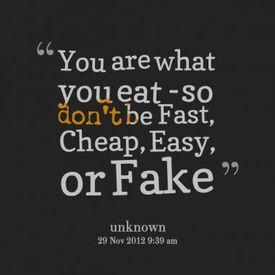Is this why some struggle to lose?!

jelleigh
Posts: 743 Member
So just watched this clip on the calorie information on food labels, websites, menus etc. I know it's not conclusive or anything but it's not altogether surprising . If this sort of nutritional inaccuracy is so common, wouldn't it be pretty easy to be tracking religiously and still not lose?
 https://youtu.be/hE2lna5Wxuo
https://youtu.be/hE2lna5Wxuo
How do you handle potential inaccuracies ? Eat to a lower target?
 https://youtu.be/hE2lna5Wxuo
https://youtu.be/hE2lna5WxuoHow do you handle potential inaccuracies ? Eat to a lower target?
1
Replies
-
I think most people struggle to lose because they aren't being very accurate with portion sizes when logging. I myself wasn't until December last year and my underestimates were astonishing.
A food scale is one of the most accurate ways to determine calorie intake. Yes there are going to be times when you're eating out or eating somewhere where you've not prepared the food yourself, but you can overestimate to err on the side of caution (I often use quick add calories to add an extra 100 or so calories on when eating out or choose a higher calorie entry)
Calorie Counting is never going to be 100% accurate but then neither is the TDEE/NEAT calculators used to determine your energy output. Over time you can see how accurate you are being from the results on the scale.0 -
If you don't lose weight over an extended period (3-4 weeks for men, 6-8 weeks or the length of a menstrual cycle for women) you need to drop calories. Counting calories is useful but you need to base weight loss decisions on actual results.0
-
How do you handle potential inaccuracies ? Eat to a lower target?
I didn't put myself in a position where there were many "potential inaccuracies".
I have a food scale, and I use it.
I didn't eat out very often ... on average, maybe a couple times a month.
I select the item from the database with a higher calorie number any time I'm in doubt.
I only track the activity I consider exercise. I don't track walking back and forth in my office, housework, grocery shopping or anything like that. I figure that could give me a little bit of a buffer.
And by doing those things, I lost weight. 2
2 -
I also tend to choose the higher calorie options when guestimating on food items when eating out. My main way to combat it? I don't make a habit of eating out. We cook our meals and harass our local store's produce section. I think a lot of people do suffer from portion control, but they also suffer from the desire of CONVENIENCE.
Gotta love that "healthy" sandwich and muffin though. Make your own and you have control over what goes in to your final product. 0
0 -
I don't count or log. That solves all that.
The end.0 -
I eat out quite a bit, 2-3 times per week. I find that most website info is "close enough". After some practice it isn't hard to spot something that is way off. Although I do think inaccuracy in logging is a small problem, the bigger problem is logging consistently. I can be accurate to the gram in what I log, but if I don't log everything I haven't really done anything.2
-
I think it's A factor, but not the main one if you are serious about losing.
I've had the same experience myself - I used to eat a specific high protein yogurt, and one day in the newspaper the producer announced that they were "very sorry to inform that the calories listed were incorrect", and that the actual amount was higher. I was really irritated, but at the same time I had to realise that these things are never 100% accurate.
I make as much as I can from scratch. I also balance it by 'lowballing' amount of calories burned at the gym.0 -
So just watched this clip on the calorie information on food labels, websites, menus etc. I know it's not conclusive or anything but it's not altogether surprising . If this sort of nutritional inaccuracy is so common, wouldn't it be pretty easy to be tracking religiously and still not lose?
 https://youtu.be/hE2lna5Wxuo
https://youtu.be/hE2lna5Wxuo
How do you handle potential inaccuracies ? Eat to a lower target?
No because of the law of large numbers. Given a sufficiently large pool of foods whose calories can vary up or down from what the label says, the variance will start to cancel out leaving you very close to the predicted amount.0
This discussion has been closed.
Categories
- All Categories
- 1.4M Health, Wellness and Goals
- 398.4K Introduce Yourself
- 44.7K Getting Started
- 261K Health and Weight Loss
- 176.4K Food and Nutrition
- 47.7K Recipes
- 233K Fitness and Exercise
- 462 Sleep, Mindfulness and Overall Wellness
- 6.5K Goal: Maintaining Weight
- 8.7K Goal: Gaining Weight and Body Building
- 153.5K Motivation and Support
- 8.4K Challenges
- 1.4K Debate Club
- 96.5K Chit-Chat
- 2.6K Fun and Games
- 4.7K MyFitnessPal Information
- 17 News and Announcements
- 21 MyFitnessPal Academy
- 1.5K Feature Suggestions and Ideas
- 3.2K MyFitnessPal Tech Support Questions






